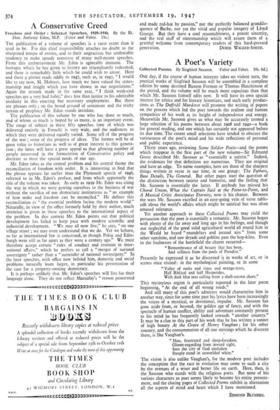A Poet's Variety
Collected Poems. By Siegfried Sassoon. I Faber and Faber. 10s. 6d.) ONE day, if the course of human interests takes no violent turn, the poetical works of Siegfried Sassoon will be assembled in a complete edition by some destined Buxton Forman or Thomas Hutchinson of the period, and the volume will be much more capacious than that which Mr. Sassoon himself edits now. It will have its own special interest for critics and for literary historians, and such early produc- tions as The Daffodil Murderer will promote the writing of papers on the process which led the poet towards the realism and human sympathies of his work at its height of independence and energy. Meanwhile Mr. Sassoon gives us what may be accurately termed a large selection of his poems between about 1908 and 1940—a book for general reading, and one which has certainly not appeared before its due time. The extant small selections have tended to obscure the variousness of the poet's mind and his wide reflections of personal and public experience.
Thirty years ago, reviewing Some Soldier Poets—and the poems which reappear in the first part of the new volume—Sir Edmund Gosse described Mr. Sassoon as "essentially a satirist." Indeed, the evidences for that definition are numerous. They are original and have an edge. To name examples, here are three of the sharpest things written in verse in our time, in one group: The Fathers, Base Details, The General. But other pages start the question of the distinction between satirist and humorist, and the feeling that Mr. Sassoon is essentially the latter. If anybody has missed his Choral Union, What the Captain Said at the Point-to-Point, and A Musical Critic Anticipates Eternity, now is his chance. Between the wars Mr. Sassoon excelled in an easy-going vein of verse table- talk about the world's affairs which might be satirical but was often amused tolerance.
Yet another approach to these Collected Poems may yield the persuasion that the poet is essentially a romantic. Mr. Sassoon began with plenty of the far away and long ago in his feelings, and though not neglectful of the good solid agricultural world all round him in the Weald he heard "roundelays and jocund airs" from some other sunshine, and saw dryads and goblins past the hop-kilns. Even in the foulnesses of the battlefield the charm recurred- " Remembrance of all beauty that has been,
And stillness from the pools of Paradise."
Presently he expressed it as he discerned it in works of art, or in scenes once visited: in the mythological painting, or in some "Valley of rocks and vines and orange-trees, Half Biblical and half Hesperides, With dark blue seas calling from a shell-strewn shore."
This mysterious region is particularly reported in the later poem beginning, "At the end of all wrong roads."
And still many of this poet's admirers would characterise him in another way, since for some time past his lyrics have been increasingly the voices of a mystical, or devotional, impulse. Mr. Sassoort has gone aside from, or beyond, the golden age of fancy, and with the spectacle of human conflict, ability and adventure constantly present to his mind he has frequently looked towards "another country." It may be a clue to this part of his work that he has written a sonnet of high beauty At the Grave of Henry Vaughan ; for his other country, and the consummation of all our strivings which he discerns there, is like Vaughan's.
"Man, frustrated and sleep-forsaken,
Gloom-regarding from inward sight, Sees the city of God unshaken
Steeply stand in unworlded white."
The vision is also unlike Vaughan's, for the modern poet includes the conception that the race in evolution may come to such a city by the avenues of a wiser and better life on earth. Here, then, is the Sassoon who stands with the religious poets. But none of his various characters as poet seems likely to become his entire present- ment, and the closing pages of Collected Poems exhibit in alternation all the aspects of mind and heart which I have mentioned.
EDMUND ELUNDEN.


































 Previous page
Previous page